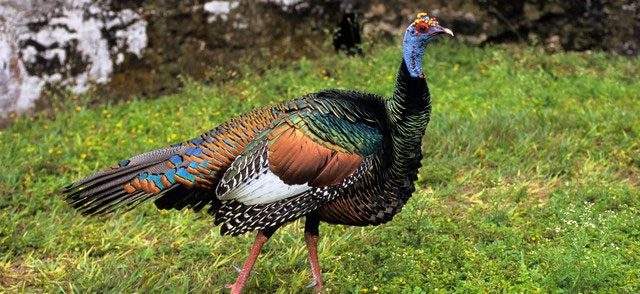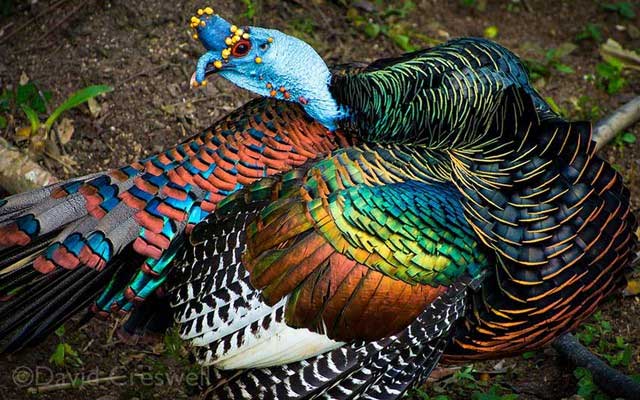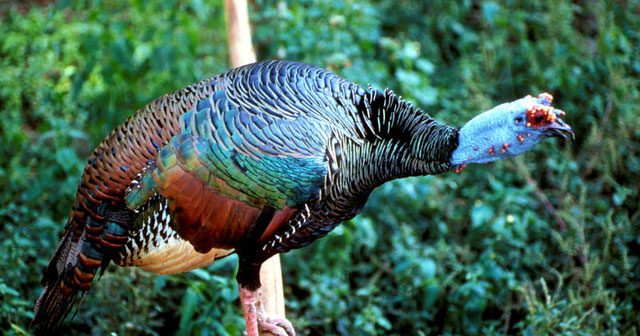Today, turkeys are no longer revered as deities or sacred beings in most cultures. However, they still play a vital role in various festivals and rituals around the world, especially during Thanksgiving in the United States and Canada.
In the past, turkeys held significant importance in the religious beliefs of the ancient Maya civilization. According to Maya tradition, turkeys were honored as sacred creatures, believed to possess special abilities granted by the gods. As messengers of the divine realm, turkeys were also seen as a bridge between the earthly world and the spiritual realm, capable of conveying messages and fulfilling the will of the gods.

Turkeys symbolize abundance, bountiful harvests, and a fulfilling life. The image of the turkey frequently appears in murals, pottery, and jewelry of the Maya people, reflecting a desire for a prosperous life. The rapid reproductive capabilities of turkeys led the Maya to associate them with new beginnings, growth, and vibrant vitality. They were worshiped as symbols of fertility, hoping for families and communities to always be abundant and prosperous.
The Maya attributed mystical powers to turkeys, considering them as vessels of divine energy and symbols of spiritual significance. Therefore, these birds were honored through rituals, symbolizing their elevated status in Maya society.
Originally domesticated by the Maya, turkeys played a central role in religious ceremonies and rituals, where they were seen as indispensable participants. Their presence in these sacred rites highlighted their importance as symbols of power and prestige within Maya culture.
The widespread presence of turkeys in Maya archaeology and iconography is evidence of their revered status in ancient Maya society. Depicted in various artistic images and inscriptions, turkeys were portrayed as respected creatures with symbolic meaning.

Turkeys are believed to have a close connection with the rain god Chaac, the deity governing life and harvests. In religious ceremonies, the Maya often sacrificed turkeys to Chaac to pray for favorable rains, bountiful crops, and peaceful living. Furthermore, turkeys were also seen as symbols of war and courage. Turkey feathers were used to adorn warriors, showcasing their strength and bravery in battle.
Experts on the Maya civilization, such as Ana Luisa Izquierdo y de la Cueva and María Elena Vega Villalobos, emphasize the importance of turkeys in Maya culture, noting their connection to special powers and their role in bridging the gap between the human and divine realms. Through the interpretation of Maya artifacts and texts, scholars continue to explore the profound spiritual significance that the ancient Maya civilization attributed to turkeys.
The unique eye-like patterns on their tails contributed to the mystical aura surrounding turkeys in Maya culture. These signs were believed to grant turkeys a higher level of perception, leading the Maya to view them as beings capable of understanding the surrounding world. Similar to the revered jaguar, the Maya regarded turkeys as sacred creatures embodying spiritual significance.

In the belief of the Maya, turkeys are considered messengers of the gods, entrusted with special powers that can extend into the realms of dreams and shadows. According to interpretations by experts like Izquierdo and Vega, turkeys were believed to possess unique abilities that could influence human experiences in the nighttime world.
Turkeys were not only an important food source but also carried deep cultural and spiritual significance in the Maya civilization. They symbolized wealth, prosperity, fertility, a connection to the divine, and the spirit of bravery. The role of turkeys in religious rituals and the cultural life of the Maya reflected a close relationship between humans and the natural world.
The Significance of Turkeys in Other Ancient Civilizations
The Aztecs: The Aztecs also revered turkeys, viewing them as symbols of bravery and war. They were sacrificed to the sun god Huitzilopochtli and used in other religious ceremonies.
Ancient Egyptians: In ancient Egyptian culture, turkeys were seen as symbols of rebirth and eternal life. They were mummified and buried with the dead.
Native Americans: Some Native American tribes in North America also honored turkeys. For instance, the Lakota regarded turkeys as messengers of the spirit world and used their feathers in religious ceremonies.
Moreover, turkeys also play significant roles in the mythology of various cultures:
Greek Mythology: In Greek mythology, turkeys were believed to have been created by the goddess Artemis. Artemis is the goddess of hunting and wildlife, and turkeys were considered one of her sacred creatures.
Nordic Mythology: In Nordic mythology, turkeys were thought to be connected to Odin, the supreme god of the Norse pantheon. Turkeys were believed to have warned Odin about the impending fall of Asgard, the home of the gods.


















































